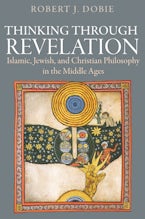- Home
- philosophy
- religion
- Thinking through Revelation
Preparing your PDF for download...
There was a problem with your download, please contact the server administrator.
Thinking through Revelation
Islamic, Jewish, and Christian Philosophy in the Middle Ages
Imprint: Catholic University of America Press
Navigating the seemingly competing claims of human reason and divine revelation to truth is without a doubt one of the central problems of medieval philosophy. Medieval thinkers argued a whole gamut of positions on the proper relation of religious faith to human reason. Thinking Through Revelation attempts to ask deeper questions: what possibilities for philosophical thought did divine revelation open up for medieval thinkers? How did the contents of the sacred scriptures of Judaism, Christianity, and Islam put into question established philosophical assumptions? But most fundamentally, how did not merely the content of the sacred books but the very mode in which revelation itself is understood to come to us – as a book "sent down" from on high, as a covenant between God and his people, or as incarnate person - create or foreclose possibilities for the resolution of the philosophical problems that the Abrahamic revelations themselves raised?
Robert Dobie explores these questions by looking in detail at the thought of three of the most important philosopher-theologians of the Middle Ages: Averroes, Moses Maimonides, and Thomas Aquinas, each working within the Islamic, Jewish, and Christian traditions respectively. Of particular interest are two questions central to medieval thought: in what sense is the world "created" and what is the proper nature and ontological status of the human intellect? These two problems took on such importance in this period, this book argues, because they forced medieval philosophers and theologians to confront the degree to which the revelation they considered authoritative made possible their resolution.
Thus, these medieval thinkers show thinkers today what possibilities are available for navigating the age-old question of the proper relation between faith and reason in a world where questions of the rationality of religious faith – especially from an inter-faith perspective – are not diminishing but increasing in importance.
Robert J. Dobie is the author of Logos and Revelation: Ibn 'Arabi, Meister Eckhart, and Mystical Hermenuetics (CUA Press).
"By letting each of the principals speak for the respective traditions, a rich interchange emerges which also reveals the extent and depth of Robert Dobie's mastery of these three - a formidable task elegantly executed."
~David Burrell, CSC, University of Notre Dame
"Thinking through Revelation would be worth reading if all it did was to offer its stimulating and erudite comparison of revelation and reason in three great medieval thinkers--Jewish, Christian, and Muslim. Valuable though this comparison is Dobie offers more. By means of a lengthy examination of Aquinas's understanding of intellection, truth, and revelation, he argues that Aquinas in every case advocates an embodied human knowing that participates in God's knowledge, above all in and through the embodied wisdom of the incarnate Word. No topic is more important for the Church today than the doctrine of divine revelation. May this rich book inspire a new generation of theological reflection on the reality of revealed knowledge!"
~Matthew Levering, James N. and Mary D. Perry Jr. Chair of Theology, Mundelein Seminary
"Dobie succeeded in providing an illuminating account of medieval debates that address fundamental epistemological questions that continue to influence the development and the interactions that the theistic religions have within themselves, among them, and with other worldviews in our contemporary context. For those interested in intellectual history, ethics of belief, and apologetics, there is much to be found in this work that can launch further research."
~Reviews in Religion and Theology
"In this new book, [Robert Dobie] investigates the tension between knowledge by human reasoning and knowledge from revelation in three of the greatest medieval thinkers: Ibn Rushd or Averroes, Moses Maimonides, and Thomas Aquinas. This is a huge task but he accomplishes it in a fluent style, with attention to detail and nuance."
~European Journal for the Study of Thomas Aquinas
"This is an original and fresh methodological perspective on the perennial debate about the relationship between revelation and philosophy, and it yields a significant advance in our understanding of medieval thought....Dobie’s exegesis is elaborate and clear, ranging over a sample of relevant Thomistic texts and grounded in thorough familiarity with reliable secondary literature. The study is an outstanding resource for graduate-level courses and specialists in both medieval philosophy."
~Sixteenth Century Journal



